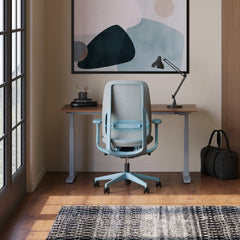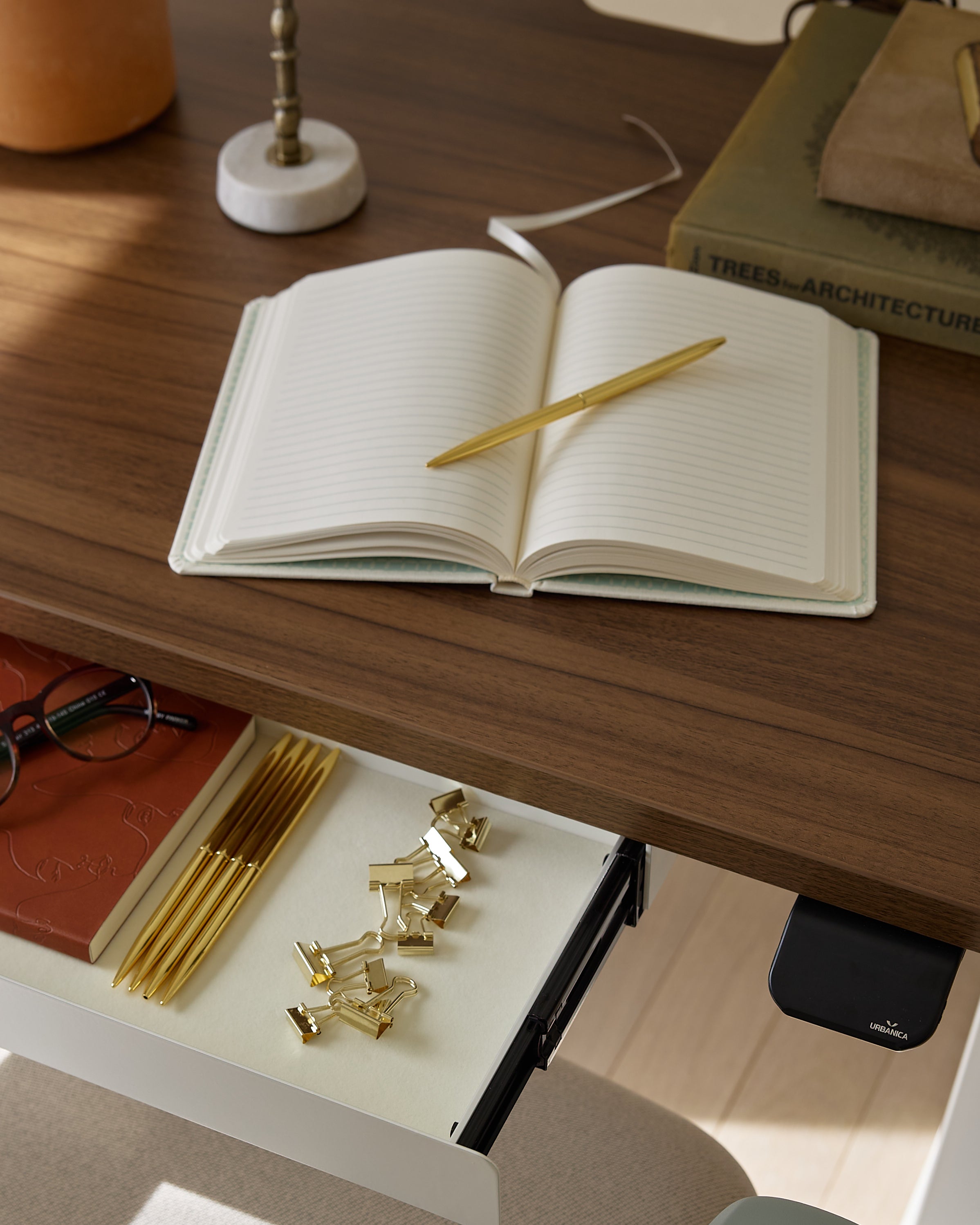Get 10% off your first order
Find the office furniture that’s designed to match your style, comfort, and needs perfectly. Subscribe
Gaming vs Executive Chairs for Remote Workers

Visit quiz page to see how we makes it easy to create an inspiring workplace

Chair comfort begins with how materials respond to body weight, heat, and movement. Mesh behaves like a flexible membrane that distributes load through tension, helping reduce pressure points across the shoulders and lower back. Solid wood acts as a stable frame that resists deformation, encouraging upright posture and dependable support. The right choice depends on whether a user values flexibility during motion or the grounded stability of a firm base.
Healthy sitting combines neutral spinal alignment, even pressure distribution, and the freedom to make micro-adjustments. These fundamentals are supported by guidance from the CDC ergonomics research center, which emphasizes neutral joint positions and small, frequent movements to reduce strain. Mesh typically enables more movement, while wood provides fixed reference points that help maintain correct posture.
Material selection also defines how a workspace feels. Transparent mesh makes small offices appear open and bright, while wood brings warmth, texture, and visual balance. The decision affects not just comfort but also focus, atmosphere, and creative energy.

Open-weave mesh allows constant airflow, helping regulate body temperature during long sitting periods. The tensioned structure distributes pressure evenly while maintaining airflow that prevents heat build-up. This breathable engineering supports comfort for people who move frequently throughout the day.
A strong mesh suspension adjusts naturally to posture changes, maintaining steady lumbar support without excessive padding. This is exemplified by Urbanica’s Novo ergonomic chair, a model designed to follow the user’s movement and maintain ergonomic consistency across different working positions.
Mesh designs create visual lightness that works well in modern offices or home studios. Their transparency keeps interiors open and balanced. When paired with ergonomic desks and workspace furniture, mesh chairs help small spaces feel organized and breathable without losing professional appeal.
Mesh should be vacuumed regularly to prevent dust accumulation that can weaken fibers. Periodic checks of the frame and tilt tension ensure even support. Selecting multi-layer, high-tension fabrics extends the chair’s lifespan and maintains comfort over time.
Wooden chairs convey stability, craftsmanship, and authenticity. The tactile grain and organic finish promote a calming environment conducive to focus and creativity. This quality is embodied in the Urbanica Muse chair, a refined piece that balances elegance and ergonomic sensitivity.
Wood resists flexing under pressure, offering structural clarity that helps users maintain proper alignment. Chairs like the Urbanica Onyx ergonomic chair use sculpted contours to cradle the spine naturally while encouraging upright posture through form rather than mechanical adjustments.
Modern wooden chairs often incorporate ergonomic curves, soft upholstery, or cushioned overlays to improve comfort without losing the integrity of wood craftsmanship. This blend of tradition and innovation creates seating suitable for long work sessions.
To preserve finish quality, wood should be dusted weekly and polished occasionally with a compatible product. Avoid direct sunlight to prevent uneven fading. Seek chairs made from responsibly sourced wood for a balance of ethics, durability, and timeless style.
| Evaluation Factor | Mesh Office Chairs | Wooden Office Chairs |
|---|---|---|
| Temperature Control | High airflow, excellent for warm environments | Retains warmth, ideal for cooler spaces |
| Movement Support | Flexible surface adjusts to posture shifts | Stable frame encourages consistent alignment |
| Surface Pressure | Even distribution across mesh tension | Firm support, softened by contoured or cushioned surfaces |
| Visual Presence | Light, modern, and space-saving | Solid, classic, and architectural |
| Maintenance | Simple fabric care | Occasional polishing and finish upkeep |
| Longevity | Retains comfort with tension checks | Decades of durability with proper care |
Mesh is ideal for users who move frequently, valuing flexibility and airflow. Wood suits those who prefer a grounded feel and sculpted stability. The optimal choice depends on climate, sitting habits, and aesthetic preferences rather than a single best option.
Hybrid chairs merge mesh breathability with wooden stability. They balance the flexibility of mesh with the tactile depth of natural materials, creating harmony between ergonomic performance and interior design.
An example of this balanced approach is the Urbanica Seashell chair, a design that integrates a contoured wood frame with a breathable backrest. The result is furniture that feels both substantial and light—suitable for creative studios and contemporary offices.
Hybrid chairs are ideal for professionals who value warmth and structure but also need comfort during extended work hours. They’re versatile for environments that must feel both personal and professional.
1. Sit with hips fully back and feet flat; your knees should form a natural right angle.
2. Lean back, then forward; the chair should maintain lumbar contact.
3. Move and reach naturally; no part of the chair should restrict movement or circulation.
Dynamic professionals who shift positions throughout the day tend to prefer mesh chairs for their responsive support.
Focused thinkers who work for long, uninterrupted stretches often favor the supportive stillness of wood.
Multifunctional users—those who host clients or blend work with leisure—may find hybrid models provide the best overall balance.
Warm or humid offices benefit from mesh, while cooler rooms pair better with wooden or upholstered options. Adapting to environmental conditions ensures consistent comfort across different seasons.
The goal of any ergonomic chair is to preserve the spine’s natural curve. Mesh achieves this through dynamic tension, while wood relies on precisely carved backrests or additional cushions. Both can succeed if the lower back remains fully supported during sitting and leaning.
Mesh seats should offer consistent tension without sagging. Wooden seats benefit from gentle contouring or breathable fabric pads that diffuse pressure at the sit bones. Proper seat height adjustment complements these design features.
Armrests should align naturally with elbow height, helping shoulders stay relaxed. A controlled recline encourages gentle posture variation throughout the day. Reliable, simple mechanisms often outperform complex ones that users rarely adjust correctly.
Matching material tones creates a unified workspace. Mesh pairs beautifully with glass, metal, and lighter woods. Wooden chairs complement textured fabrics and solid surfaces, adding visual depth. Either choice becomes more effective when integrated with surrounding furniture.
Exploring a refined selection helps focus your choice. The Urbanica designer chair collection offers mesh, wooden, and hybrid designs that demonstrate how ergonomics and aesthetics can align seamlessly.

A chair performs best when paired with furniture that shares its design intent. If you’re building a cohesive workspace, consider custom furniture bundles from Urbanica to align desk heights, tones, and ergonomic parameters for your preferred posture and workflow.
Mesh chairs thrive in dynamic setups such as shared offices or creative studios where airflow and quick movement matter most.
Wooden chairs offer a grounded, enduring presence suitable for private offices, study rooms, and design-forward work environments where atmosphere and comfort are equally valued.
Keep feet flat and hips slightly higher than knees.
Maintain contact between lumbar support and lower back.
Alternate between upright and reclined positions periodically.
Stand or stretch briefly every hour to boost circulation.
1. Adjust chair height to keep wrists straight while typing.
2. Set recline tension for light, supportive resistance.
3. Align monitor height with eye level.
4. Keep frequently used items within easy reach to reduce shoulder strain.
Wooden chairs with contoured support encourage steady posture and focus during long sessions. They maintain alignment naturally without constant adjustment.
Mesh chairs enhance freedom of movement, enabling frequent turning, reaching, and collaboration. Their breathability helps maintain comfort through bursts of activity.
Hybrid designs integrate well into multipurpose rooms. They combine the sculptural beauty of wood with the cooling comfort of mesh, creating furniture that complements both work and living spaces.
The Novo ergonomic chair exemplifies breathable tension that supports subtle posture changes, ideal for designers, writers, or remote professionals seeking balance between comfort and mobility.
The Seashell chair unites organic form and breathable materials, offering a design-forward option that transitions seamlessly from home to professional settings.
Vacuum fabric surfaces monthly to remove dust buildup.
Check frame joints seasonally to ensure tension stability.
Spot clean with mild detergent and let air dry.
Dust weekly with a soft microfiber cloth.
Polish occasionally with appropriate finish oil.
Keep out of prolonged direct sunlight to preserve tone consistency.
Leave enough room behind and beside the chair to recline or rotate freely. Mesh chairs can be placed closer to light sources without visually cluttering the space, while wooden chairs benefit from open surroundings that highlight craftsmanship.
Match your chair to its workspace: light surfaces for mesh chairs and rich wood desks for classic wooden seating. The synergy between tone and texture reinforces focus and comfort.
| Preference Signal | Choose Mesh When | Choose Wood When |
|---|---|---|
| Climate | Warm or humid workspace | Cool, temperature-controlled setting |
| Movement Style | Frequent repositioning and collaborative activity | Stationary, concentrated tasks |
| Aesthetic Goal | Light, modern, transparent look | Classic, substantial, and timeless |
| Maintenance | Prefer low-effort upkeep | Enjoy caring for natural finishes |
Sit in each material and notice your breathing, back support, and shoulder tension after several minutes. Comfort is personal—select the chair that leaves you balanced, relaxed, and supported.
When ready to compare high-quality chairs side by side, browse the Urbanica chair collection for mesh, wood, and hybrid designs that highlight craftsmanship and comfort.
To coordinate the entire setup, explore Urbanica’s furniture bundle builder to combine complementary chairs, desks, and accessories suited to your specific workspace goals.
Choosing between mesh and wooden office chairs is ultimately about alignment—between your habits, your environment, and your design values. Mesh provides lightness and flexibility for active users. Wood delivers grounding presence and timeless comfort for focused professionals. Hybrid designs merge the two into versatile forms that fit modern living. The best chair is not the trendiest or most complex—it’s the one that quietly supports your body, your space, and the way you work every day.

Gaming vs Executive Chairs for Remote Workers

Best Office Chairs for Creative Professionals

Top Chair Accessories for Comfort and Support
Get 10% off your first order
Find the office furniture that’s designed to match your style, comfort, and needs perfectly. Subscribe
Leave a comment